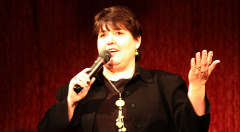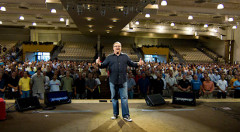 I was talking to a friend the other day about some of the stresses bi-vocational pastors face that are unique. During our brainstorming session, we hit upon one that struck a chord—guilt.
I was talking to a friend the other day about some of the stresses bi-vocational pastors face that are unique. During our brainstorming session, we hit upon one that struck a chord—guilt.
You might recognize some of these thoughts:
1. I must be doing something wrong because ...
2. I have to work a second job.
3. My church isn’t growing.
4. I can’t afford to pay my staff a full salary.
5. Even I get bored during my sermons.
6. We haven’t had a baptism in a year.
7. I can’t get enough workers to …
Moses knew he was special. His entire story said that he was chosen by God for a purpose. Then he messed up. His life didn’t go according to his plan, and he ended up on the backside of nowhere for 40 years. Yup. He probably thought he had his chance and it was gone. Now he just had to do his best to face today.
Then God showed up. If you take time to read Moses' interactions with God in Exodus 3-7 and 14, you will find how Moses dealt with guilt and lack to be the person God called him to be.
1. He was honest with God. Moses didn’t think a lot of himself, and he didn’t pretend. He brought his doubts to God and let God address them.
2. He did what God said. After God addressed his fears and concerns, Moses moved forward.
3. He came back to God with more doubts. Seriously—Moses didn’t just hear what God said and did it. Every little wrinkle brought him back to God: “They won’t listen ... ; he won’t listen ... ”
4. He expected God to fix the problems. Once he brought things to God, problems didn’t hit Moses the same way. When things went wrong, he returned to God with the problem. It is almost like he kept coming back, saying, “I told you this wouldn’t work. What’s next?”
5. He let God be his strength. Moses took hit after hit. People didn’t listen, then they did and later deserted. Pharaoh kept promising compliance and reneging. Instead of feeling there must be something wrong with him, Moses did his part and brought it all back to God.
If you are walking around under a load of guilt, is it possible God isn’t the one doing all the work? He called you. He put you in this impossible situation—not so that you could feel the pain or win the war, but so that He would be glorified and His kingdom would grow.
As a coach, I talk to pastors who have hit the wall a lot. One of the best things you can do when you hit the wall of guilt is to remember how you got here. It is entirely possible that, like Moses and the 10 plagues, you are supposed to go through a time when you discover what doesn’t work before you find what does. It is also possible that God is doing work you haven’t seen yet.
Now it is your turn. In the comments below, please help us answer this question: How would you know if your frustration is God’s opportunity or just a mistake?
Kim Martinez is an ordained Assemblies of God pastor with a master's degree in theology from Fuller Seminary. She is a ministry and life development coach and can be found online at deepimprints.com. She writes a weekly column for ministrytodaymag.com.

 The pastor had been called from his rural church to another part of the country. He was excited about the new challenge, as he well should have been. In a parting comment to a friend, he assessed the state of spirituality of the church members he was leaving behind:
The pastor had been called from his rural church to another part of the country. He was excited about the new challenge, as he well should have been. In a parting comment to a friend, he assessed the state of spirituality of the church members he was leaving behind: Psalm 2, perhaps more then any other Bible text, accurately portrays the spirit of our time. Indeed, it also proclaims our correct response to Satan’s bold advance. Although it was quoted by the early church (Acts 4:25-26), God has set its full realization for the end of this age.
Psalm 2, perhaps more then any other Bible text, accurately portrays the spirit of our time. Indeed, it also proclaims our correct response to Satan’s bold advance. Although it was quoted by the early church (Acts 4:25-26), God has set its full realization for the end of this age. I’m often asked, “When should I leave a church or ministry team? How bad does it have to get?”
I’m often asked, “When should I leave a church or ministry team? How bad does it have to get?” He achieved All-American honors in football and was drafted into the NFL. He played for the Los Angeles Rams and the San Diego Chargers. But with success, Miles McPherson found himself trapped in drug abuse.
He achieved All-American honors in football and was drafted into the NFL. He played for the Los Angeles Rams and the San Diego Chargers. But with success, Miles McPherson found himself trapped in drug abuse. Every church needs a plan to disciple its congregation. You need a plan to take people from “come and see” to “come and die”—which is where Jesus took His disciples during His earthly ministry. For most of the history of the church, that discipleship plan was simply called a catechism. It’s not a new idea.
Every church needs a plan to disciple its congregation. You need a plan to take people from “come and see” to “come and die”—which is where Jesus took His disciples during His earthly ministry. For most of the history of the church, that discipleship plan was simply called a catechism. It’s not a new idea.
